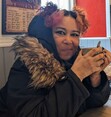When We First Become Other
When We First Become Other
By Sumiko Saulson
Winner, Fall 2017 Berkeley City College / BCC Voice Essay Contest, “Reframing the Other”
It is the very nature of human self-awareness which creates Othering. From birth, we see the world from a personal vantage point. We first take in sounds, smells and images of our personal tribe: parents, siblings, neighbors and grandparents. They are the village to which Self belongs. This is true even for those of us mainstream America views as Other. So how does one first become Othered? This occurs through contact with multicultural groups, and with mainstream media. Once we view ourselves through the lens of mass media, it becomes possible to reframe Self as Other.
In late 1970s, watching a television show called The Jeffersons. I noticed their neighbors, the Willises, an interracial couple, had one white actor and one black actress playing their mixed race children. As a biracial black and Jewish child this made feel a bit like a space alien. The constant string of “zebra” jokes about their mixed heritage added to that feeling. Strangers sometimes stopped our mom on the street to ask questions about me and my brother’s heritage, and ask to touch our hair. But this was the first time an outside authority verified the strangeness of being biracial.
When I became a fiction writer, I sought to remedy the absence of multicultural stories by filling my books with them. For me, it seemed unnatural that stories taking place in diverse metropolitan areas like Los Angeles or New York often have predominately white casts.
It wasn’t until I’d been writing novels for a few years that it occurred to me that I might try introducing race later in the narrative. It was after reading an article about how some of Suzanne Collin’s literary fandom was freaking out about Rue being black in the movie. Although the book clearly described her as dark skinned and having African American features, readers subconsciously reframed the character in their minds as white.
As an experiment, I wrote the first two chapters of my book, “Happiness and Other Diseases,” without revealing the ethnicity of the central character, Flynn Keahi. He’s half Chinese and half Hawaiian. Nowadays I am fairly political, so my heritage is a normal topic of conversation. When I was younger, it wouldn’t come up as often in the day to day living of life. That being the case, I decided to have his ethnicity come up when it seemed most natural in the narrative: that is, through the eyes of a third party, his girlfriend’s mother, upon meeting him for the first time. That way the reader had an attachment to the character before any issues regarding ethnicity came up.
In reframing the Other, one might consider the fact that every single other person on the planet views life initially, and primarily, from the vantage of self. Absent of external Othering forces, a person in a self-segregated environment will view him or herself as quite the norm. The eroticizing of those who are perceived as different or unusual due to ethnic heritage, disability, sexual preference, or gender presentation is rooted in our denial of the Othered person’s self. Self being the vantage point from which we all view the world.
In order to ethically reframe the notion of Other, those of us who have for whatever reason, come to view ourselves as “the norm” or what is usual will have to accept the fact that our perception is biased.
Readers of “The Hunger Games” and “Happiness and Other Diseases” alike threw a filter of whiteness as a default setting onto the character. As a cis-gen female, I run into people who resist terms like cis-gen, even while knowing they exist to dispute the idea that we are “default” or “normal.” This is an attitude people must overcome. We cannot have true equality among diverse populations while clinging to the notion that some of us are “normal” – “default” – or “usual.”
People cling to this attitude even where it is statistically disproven: for example, many white people think of white as the default; Western Media sells it as such, yet white people are only 18% of the global population, therefore a statistical minority. If a statistical minority can believe itself the default due to acculturation, then perhaps we should question the notion of who is actually the Other here.



